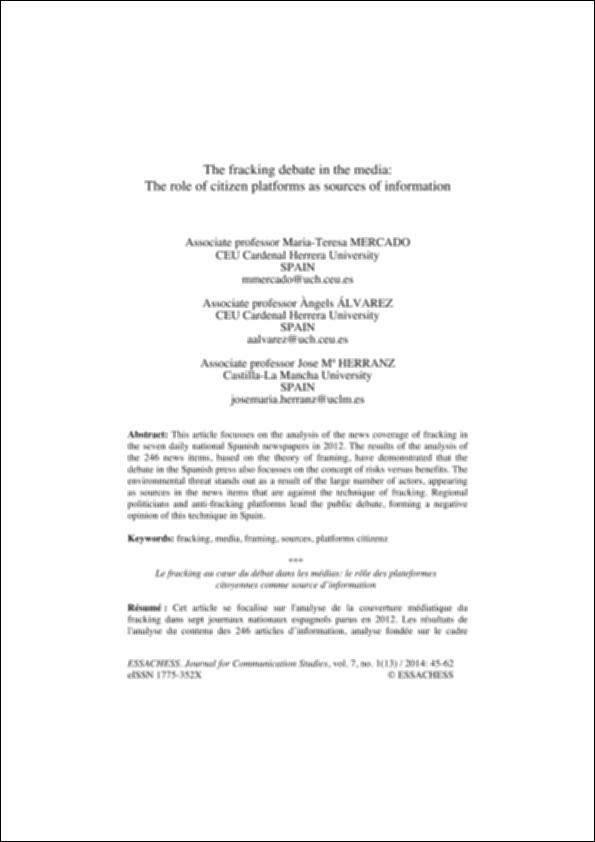Por favor, use este identificador para citar o enlazar este ítem:
http://hdl.handle.net/10637/7422The fracking debate in the media : the role of citizen platforms as sources of information
| Título : | The fracking debate in the media : the role of citizen platforms as sources of information |
| Autor : | Mercado Sáez, María Teresa. Álvarez Villa, Àngels Herranz de la Casa, José María |
| Materias: | Industria energética - España.; Periodismo medioambiental - España.; Prensa - Análisis de contenido - España.; Press - Content analysis - Spain.; Recursos energéticos - España.; Petróleo - Yacimientos - España.; Newspapers - Content analysis - Spain.; Mass media and the environment - Spain.; Power resources - Spain.; Gas natural - Yacimientos - España.; Oil fields - Spain.; Periódicos - Análisis de contenido - España.; Natural gas mines and minning - Spain.; Energy industries - Spain. |
| Editorial : | University of Montpellier. ESSACHESS |
| Citación : | Mercado, M.T., Álvarez, À. y Herranz, J.M. (2014). "The fracking debate in the media : the role of citizen platforms as sources of information". ESSACHESS : journal for communications studies. Vol. 7, n. 1 (13), pp. 45-62. |
| Resumen : | This article focusses on the analysis of the news coverage of fracking in the seven daily national Spanish newspapers in 2012. The results of the analysis of the 246 news items, based on the theory of framing, have demonstrated that the debate in the Spanish press also focusses on the concept of risks versus benefits. The environmental threat stands out as a result of the large number of actors, appearing as sources in the news items that are against the technique of fracking. Regional politicians and anti-fracking platforms lead the public debate, forming a negative opinion of this technique in Spain. Cet article se focalise sur l'analyse de la couverture médiatique du fracking dans sept journaux nationaux espagnols parus en 2012. Les résultats de l'analyse du contenu des 246 articles d’information, analyse fondée sur le cadre méthodologique offert par la théorie du « framing », ont montré que, même dans la presse écrite espagnole, le débat s'articule autour du rapport risques / bénéfices. La menace environnementale est mise en évidence à travers un grand nombre d'acteurs qui s'y opposent et qui représentent les sources de ces articles d’information. Les hommes politiques régionaux et les plateformes anti-fracking sont les protagonistes du débat public qui donnent une lecture négative à cette technique en Espagne. |
| Descripción : | Este artículo se encuentra disponible a texto completo en la siguiente URL: http://www.essachess.com/index.php/jcs/article/view/234/260 |
| URI : | http://hdl.handle.net/10637/7422 |
| Derechos: | http://creativecommons.org/licenses/by-nc-nd/4.0/deed.es |
| ISSN : | 1775-352X (Electrónico). 2066-5083. |
| Fecha de publicación : | 1-ene-2014 |
| Centro : | Universidad Cardenal Herrera-CEU |
| Aparece en las colecciones: | Dpto. Comunicación e Información Periodística |
Los ítems de DSpace están protegidos por copyright, con todos los derechos reservados, a menos que se indique lo contrario.


